Download IGNOU PGDFSQM Project Dissertation for MVPP 003
The IGNOU PGDFSQM Project Dissertation for the course MVPP 003 is a mandatory academic requirement for students enrolled in the PGDFSQM program at Indira Gandhi National Open University (IGNOU). This IGNOU PGDFSQM Project Dissertation, typically undertaken in the final phase of the program, requires students to apply the theoretical knowledge gained throughout their coursework to a practical research problem within the field of food safety and quality management.
Whatsapp us to get the Personalized (Customized) IGNOU PGDFSQM Project Dissertation and Synopsis
The IGNOU PGDFSQM Project Dissertation culminates in a written report that must be submitted to IGNOU for evaluation. This report is expected to be well-structured, clearly written, and reflect a deep understanding of the subject matter. Successful completion of the project is essential for obtaining the PGDFSQM certification.
What is the ideal project duration for the PGDFSQM course?
The ideal project duration for the IGNOU PGDFSQM course typically spans 3 to 6 months. This time frame allows students to complete all phases of the project, including topic selection, proposal submission, data collection, analysis, writing the dissertation, and preparing for the viva voce.
Breakdown of the Project Duration:
Topic Selection and Proposal Submission (1-2 months):
- Identifying a research topic, conducting a preliminary literature review, and drafting the research proposal for approval.
Data Collection and Research (1-2 months):
- Gathering data through surveys, experiments, or other methods, and conducting the necessary research activities.
Data Analysis and Interpretation (1 month):
- Analyzing the collected data using appropriate methods and interpreting the results in the context of the research objectives.
Writing the Dissertation (1-2 months):
- Organizing the findings into a well-structured dissertation, including drafting, revising, and finalizing the document.
Final Submission and Viva Voce Preparation (1 month):
- Preparing the final version of the dissertation for submission and getting ready for the oral defense (viva voce).
How can you conduct effective data collection and analysis for your IGNOU PGDFSQM Project Dissertation?
Conducting effective data collection and analysis for your IGNOU PGDFSQM project involves several key steps. Here’s a guide to help you through the process:
1. Define Your Research Objectives:
- Clearly outline what you aim to achieve with your research. Your data collection should be designed to answer specific research questions or test hypotheses related to food safety and quality management.
2. Choose the Right Data Collection Methods:
Primary Data: Collect original data directly from the source. Methods include:
- Surveys/Questionnaires: Design structured questions to gather information from a target population.
- Interviews: Conduct in-depth interviews with experts, stakeholders, or participants.
- Experiments: Set up controlled experiments to test specific variables.
- Observations: Record observations in a natural setting relevant to your research.
Secondary Data: Use existing data from reliable sources such as:
- Research Articles: Academic journals and industry reports.
- Government Reports: Statistics and data published by regulatory bodies.
- Company Records: Internal records or reports from relevant organizations.
3. Ensure Ethical Compliance:
- Obtain informed consent from participants.
- Ensure confidentiality and anonymity of the data collected.
- Follow ethical guidelines provided by IGNOU and other relevant authorities.
4. Sampling Strategy:
- Sampling Methods: Choose an appropriate sampling method (random, stratified, purposive, etc.) based on your research objectives.
- Sample Size: Determine a sample size that is statistically significant to ensure that your results are reliable.
5. Data Collection Process:
- Pilot Testing: Conduct a pilot test of your data collection instruments (e.g., questionnaires) to identify any issues and make necessary adjustments.
- Data Recording: Maintain accurate records of your data collection process, including dates, locations, and any challenges encountered.
- Quality Control: Regularly review collected data to check for completeness, accuracy, and consistency.
6. Data Analysis Techniques:
Quantitative Data:
- Descriptive Statistics: Calculate means, medians, modes, and standard deviations to summarize the data.
- Inferential Statistics: Use tests like t-tests, chi-square, ANOVA, or regression analysis to identify relationships or differences between variables.
Qualitative Data:
- Thematic Analysis: Identify and analyze patterns or themes within qualitative data (e.g., interview transcripts).
- Content Analysis: Systematically categorize verbal or textual data to quantify the presence of certain words, themes, or concepts.
7. Use of Software Tools:
- Statistical Software: Use software like SPSS, R, or Excel for quantitative analysis.
- Qualitative Analysis Software: Tools like NVivo or Atlas.ti can help manage and analyze qualitative data.
8. Interpretation of Results:
- Compare your findings with existing literature and theories.
- Discuss how your results contribute to the field of food safety and quality management.
- Consider the limitations of your study and how they might affect your findings.
9. Reporting Your Findings:
- Present your analysis in a clear and organized manner in your dissertation.
- Use visual aids like charts, graphs, and tables to enhance understanding.
- Ensure that your conclusions are logically drawn from the data analysis.
10. Review and Validation:
- Cross-check your findings with your supervisor or peers.
- Consider conducting a second round of analysis or validation if needed.
Samples of IGNOU PGDFSQM Project Dissertation topics for MVPP 003
- Awareness And Attitudes Of Food Safety Knowledge And Practice Of Consumers
- Training Modules For Hygiene Awarenes (Gmp And Ghp) In Food Handlers
- Nutritional Awareness And Preferences For Ready To Eat Foods Amongst Working And Non-Working Women
- Knowledge Of Rural Women Regarding Health And Nutritional Practices Towards Their Pre-School Children
- Assessment Of Nutritional Status Of Women Diabetic Patients In The Municipality Area
What is the procedure for submitting the IGNOU PGDFSQM Project Dissertation?
Submitting your PGDFSQM project at IGNOU involves a series of steps that ensure your dissertation meets the university’s requirements. Here’s a step-by-step guide to the submission procedure:
1. Complete Your Dissertation:
- Ensure your dissertation is complete, following the structure and format prescribed by IGNOU. It should include all necessary sections: title page, declaration, certificate, acknowledgments, table of contents, introduction, literature review, methodology, results, discussion, conclusion, references, and appendices (if applicable).
2. Check for Plagiarism:
- Before submission, run your dissertation through a plagiarism detection tool to ensure originality. IGNOU typically requires that the similarity index be below a certain threshold (usually 20%). Include the plagiarism report with your submission if required.
3. Prepare the Synopsis:
- Along with your dissertation, you may need to submit a synopsis or summary of your project. This should briefly describe your research objectives, methodology, findings, and conclusions.
4. Obtain Supervisor’s Approval:
- Your dissertation needs to be reviewed and approved by your academic supervisor. They will check the content, methodology, and overall quality of your work. Obtain their signature on the approval form or certificate section of your dissertation.
5. Prepare the Submission Package:
- Printed Copies: Prepare multiple hard copies of your dissertation as required by IGNOU. Typically, two copies are needed—one for the university and one for the supervisor.
- Digital Copy: Some regional centers or departments may require a digital copy (PDF format) of the dissertation on a CD or USB drive.
6. Fill Out the Required Forms:
- Complete any forms required by IGNOU for project submission. This may include a submission form, plagiarism declaration, and the supervisor’s approval form. These forms are usually provided by your regional center or can be downloaded from the IGNOU website.
7. Submit to the Regional Center:
- Submit the hard copies and digital copy (if required) of your dissertation along with the completed forms to your designated IGNOU regional center. Ensure that you submit within the deadline specified by the university.
8. Receive Acknowledgment:
- After submission, you should receive an acknowledgment or receipt from the regional center confirming that your dissertation has been accepted for evaluation. Keep this receipt for your records.
9. Wait for Evaluation:
- Your dissertation will be evaluated by external examiners appointed by IGNOU. This process may take several weeks to a few months. You may be called for a viva voce (oral defense) as part of the evaluation.
10. Attend the Viva Voce (if required):
- Prepare for and attend the viva voce, where you will defend your research before a panel. This is an important part of the evaluation process.
11. Check for Results:
- After the evaluation process is complete, your results will be posted on the IGNOU website. This will include your grades for the dissertation and viva voce (if applicable).
12. Collect Your Certificate:
- Once you pass the dissertation and viva voce, you will receive your Post Graduate Diploma in Food Safety and Quality Management certificate from IGNOU.
How can you find relevant research papers or articles for your IGNOU PGDFSQM Project Dissertation?
Finding relevant research papers or articles is crucial for developing a solid foundation for your PGDFSQM project. Here’s how you can locate and access quality sources:
Use Academic Databases:
- Google Scholar: A free search engine that indexes scholarly articles, theses, books, conference papers, and patents. Use specific keywords related to your topic to find relevant papers.
- PubMed: Especially useful for topics related to food safety, health, and nutrition. It provides access to a large database of biomedical literature.
- ScienceDirect: Offers access to a wide range of scientific and technical research articles, particularly in the fields of food science, environmental science, and chemistry.
- JSTOR: A digital library with a vast collection of academic journals, books, and primary sources across many disciplines.
- SpringerLink: Provides access to journals, books, and conference proceedings, especially in the sciences, including food technology and quality management.
Access University Libraries:
- IGNOU e-Resources: As an IGNOU student, you can access a variety of academic journals, e-books, and databases through the IGNOU library portal.
- National Digital Library of India (NDLI): A repository offering free access to a wide range of educational resources, including research papers and articles.
Use Specialized Journals:
- Journal of Food Safety: Focuses on food safety issues, including microbial, chemical, and physical hazards in food.
- Food Control: Publishes research on food safety, quality, and regulatory practices.
- International Journal of Food Microbiology: Concentrates on the microbiological aspects of food safety.
- Journal of Food Quality: Covers research on food quality and consumer acceptability.
Search Using Specific Keywords:
- Use precise and specific keywords related to your research topic. Combine terms like “food safety,” “quality management,” “risk assessment,” “HACCP,” or any other relevant terms.
- Use Boolean operators to refine your search:
- AND to combine terms (e.g., “food safety AND quality control”).
- OR to find papers with either term (e.g., “HACCP OR food quality”).
- NOT to exclude certain terms (e.g., “food safety NOT microbiology”).
Look at References in Relevant Articles:
- Once you find a relevant article, review its references section. This can lead you to other key papers or sources that are directly related to your topic.
Access Open Access Journals:
- Many research articles are freely available through open access journals. Websites like DOAJ (Directory of Open Access Journals) list a wide range of freely accessible journals across various fields.
Use ResearchGate or Academia.edu:
- These platforms allow researchers to share their publications. You can often request full-text copies of articles directly from the authors if they are not freely available.
Consult Your Supervisor:
- Your academic supervisor can recommend key journals, articles, and other resources that are highly relevant to your topic. They might also have access to paid resources through institutional subscriptions.
Visit Professional Associations:
- Food Safety and Standards Authority of India (FSSAI): Offers resources and publications related to food safety regulations in India.
- International Association for Food Protection (IAFP): Provides access to journals, reports, and industry updates related to food safety.
Use Citation Management Tools:
- Tools like Zotero, Mendeley, or EndNote can help you organize and cite research papers effectively. These tools also have search functionalities to discover relevant research papers.
How important is the IGNOU PGDFSQM Project Dissertation in determining the final grade?
The IGNOU PGDFSQM Project Dissertation in the IGNOU PGDFSQM course plays a significant role in determining your final grade. Here’s why:
1. Weightage in the Overall Assessment:
- The project typically carries substantial weightage in the overall evaluation of the PGDFSQM program. While the exact percentage may vary, it often constitutes a significant portion (e.g., 30-50%) of the final grade. This means that performing well in your project can greatly influence your overall score in the diploma.
2. Application of Theoretical Knowledge:
- The project is an opportunity to apply the theoretical concepts and methodologies you’ve learned during the course. Your ability to effectively translate this knowledge into practical research and analysis is critical and is heavily evaluated.
3. Evaluation Criteria:
- Research Quality: The depth of your research, the rigor of your methodology, and the originality of your findings are key factors in determining your project grade.
- Content and Structure: How well you organize and present your dissertation, including the clarity of your writing, the logic of your arguments, and adherence to formatting guidelines, also affects your grade.
- Viva Voce Performance: If a viva voce is required, your ability to defend your research and answer questions from the evaluation panel contributes to your final grade.
4. Impact on Certification:
- Since the project is an integral part of the program, failing to meet the required standards in your dissertation can significantly impact your ability to pass the course. A strong performance in the project can compensate for weaker areas in written exams or assignments.
5. Skill Demonstration:
- The project demonstrates your ability to conduct independent research, analyze data, and contribute to the field of food safety and quality management. These skills are not only important for your academic evaluation but also for your professional development and employability.
6. Final Grade Calculation:
- The final grade is usually a composite of your performance in written exams, assignments, and the project dissertation. The high weightage of the project means that it can tip the balance between different grade categories (e.g., distinction, first class, second class).
Ready to get your IGNOU PGDFSQM Project Dissertation Report and Synopsis Sample PDF for MVPP 003?
- Call us or WhatsApp us at: 9958947060, 9354637830
- Visit: SHRICHAKRADHAR.COM
-
Sale!

-
Sale!

IGNOU PGDFSQM Project (MVPP 001) Synopsis/Proposal & Project Report/Dissertation in Soft-Copy (Sample-4)
Original price was: ₹499.00.₹149.00Current price is: ₹149.00. -
Sale!

IGNOU PGDFSQM Project (MVPP 001) Synopsis/Proposal & Project Report/Dissertation in Soft-Copy (Sample-3)
Original price was: ₹499.00.₹149.00Current price is: ₹149.00. -
Sale!

IGNOU PGDFSQM Project (MVPP 001) Synopsis/Proposal & Project Report/Dissertation in Soft-Copy (Sample-2)
Original price was: ₹499.00.₹149.00Current price is: ₹149.00. -
Sale!

IGNOU PGDFSQM Project (MVPP 001) Synopsis/Proposal & Project Report/Dissertation in Soft-Copy (Sample-1)
Original price was: ₹499.00.₹149.00Current price is: ₹149.00.





